Find out how Carpenter Bees' complex behaviors hint at a surprising level of intelligence, offering a fascinating glimpse into insect cognition.
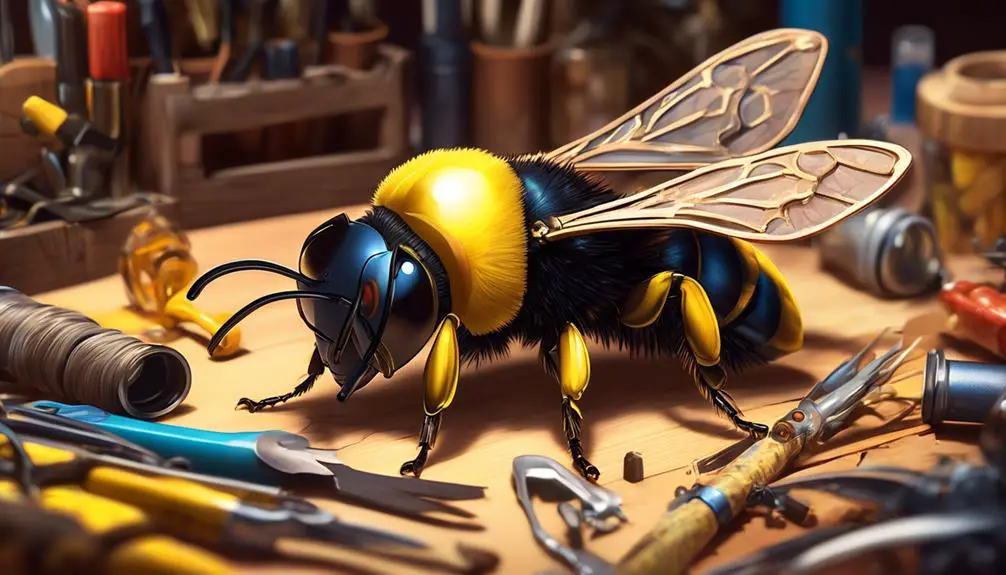
Are Carpenter Bees Smart
Navigating the world of insects is like exploring a labyrinth, filled with fascinating behaviors and intricate social structures.
You've likely encountered Carpenter Bees, those large, noisy pollinators that can be found busily boring into wood. They're well known for their woodworking skills, but have you ever wondered about their intelligence? Despite their small size, these creatures display surprisingly complex behaviors, suggesting a level of cognition that we're only beginning to understand.
Why should you care? Well, understanding their cognitive abilities could not only revolutionize our understanding of insect intelligence but could also provide us with invaluable insights into the workings of our own brains.
The journey into the mind of the Carpenter Bee is just beginning, and you're invited to join the expedition.
Key Takeaways
- Carpenter bees exhibit advanced problem-solving abilities, including spatial awareness, memory recall, and strategic planning.
- Despite being solitary, carpenter bees have unique social interactions, with females creating a matrilineal social structure and males displaying territorial behavior.
- Carpenter bees demonstrate learning and memory capabilities, including spatial memory for navigation and associative learning for foraging.
- Observational studies suggest that carpenter bees possess a surprising level of intelligence, adapting flight patterns and exhibiting emotional intelligence.
Understanding Carpenter Bee Behavior
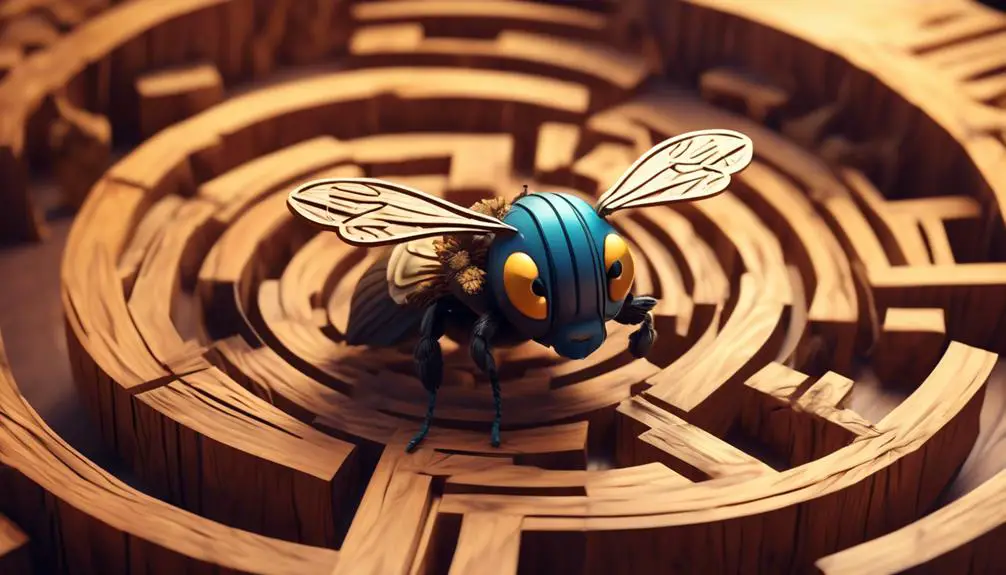
To truly comprehend the intelligence of carpenter bees, you need to delve into their intricate behavior patterns and interactions. These insects exhibit a complex suite of behaviors that reveal a surprising level of cognitive sophistication. They're not merely mindless drones; they're quite the opposite.
Consider their nesting behavior. Unlike most bees, you won't find carpenter bees living in colonies. They're solitary creatures, carving out individual nests in wood. You may think this behavior is simple, but it isn't. Each bee meticulously crafts her own nest, demonstrating an impressive ability for spatial reasoning and precision.
Next, let's examine their mating behavior. Males are fiercely territorial, displaying a keen understanding of boundaries and space. They'll patrol their territory, warding off intruders with precision and tenacity.
Lastly, consider their foraging habits. Carpenter bees don't just randomly gather nectar. They're selective, choosing flowers based on quality, not just availability. This discernment suggests a level of decision-making that speaks to their intelligence.
In short, understanding carpenter bee behavior is crucial for appreciating their cognitive abilities. From their nesting habits to their foraging decisions, these insects display an intelligence that's worth noting.
Carpenter Bees' Problem-Solving Abilities
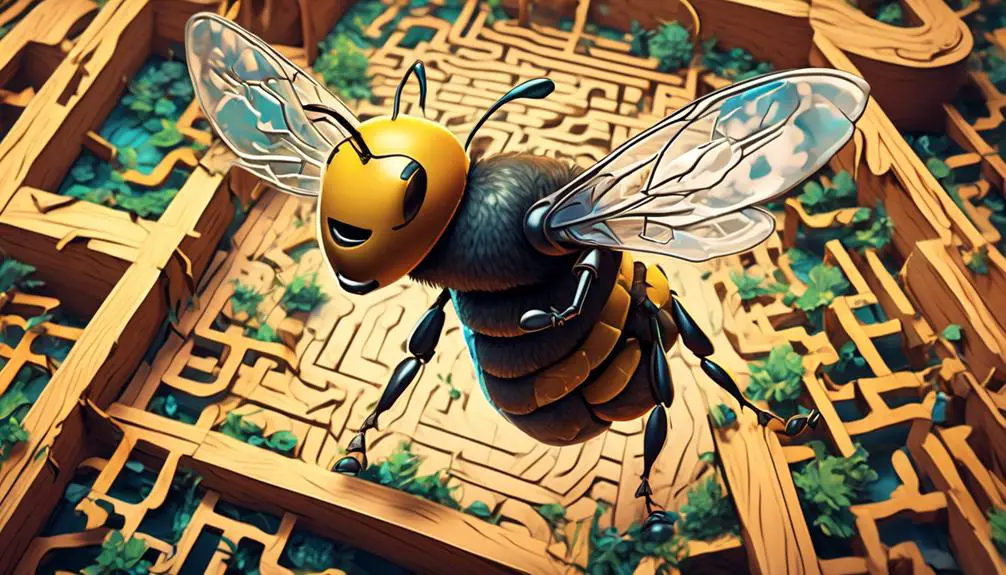
Building on their impressive behavioral traits, let's now explore how carpenter bees use their cognitive prowess to solve problems. These fascinating insects aren't just known for their ability to burrow into wood; they're also surprisingly adept at problem-solving.
Carpenter bees employ their cognitive skills in various ways, but two scenarios particularly stand out: navigation and food foraging. In their quest to find nourishment and return home safely, they employ a combination of spatial awareness, memory recall, and strategic planning.
Consider their navigation capabilities. When faced with the challenge of finding their way back to their nests, carpenter bees must remember specific landmarks and calculate the shortest path.
Similarly, during food foraging, they need to remember locations of plentiful food sources, and decide when to revisit them based on their yield.
Let's illustrate this in a table:
Cognitive Ability | Application in Carpenter Bees |
|---|---|
Spatial Awareness | Used for navigation back to their nests |
Memory Recall | Utilized in recalling food source locations |
Strategic Planning | Employed in deciding when to revisit food sources |
Social Interaction Among Carpenter Bees

You might be surprised to learn that carpenter bees, despite their solitary nature, engage in a form of social interaction that underscores their cognitive complexity. While these creatures aren't eusocial like honeybees or ants, they're not exactly loners either.
They've a unique interaction system, where the females, who are responsible for nest-building and offspring care, often return to their natal nests, creating a matrilineal social structure. Males, on the other hand, follow a territorial approach, holding down a zone and warding off other males while inviting females in.
What's interesting is how they communicate. You see, carpenter bees use a series of vibrations or 'buzzing' to send messages. For example, males often create a specific buzz to deter competitors or attract potential mates. Females might use it to signal distress or danger. This acoustic communication is a testament to their intelligence, requiring an understanding of different buzz patterns and the ability to respond appropriately.
Learning and Memory in Carpenter Bees
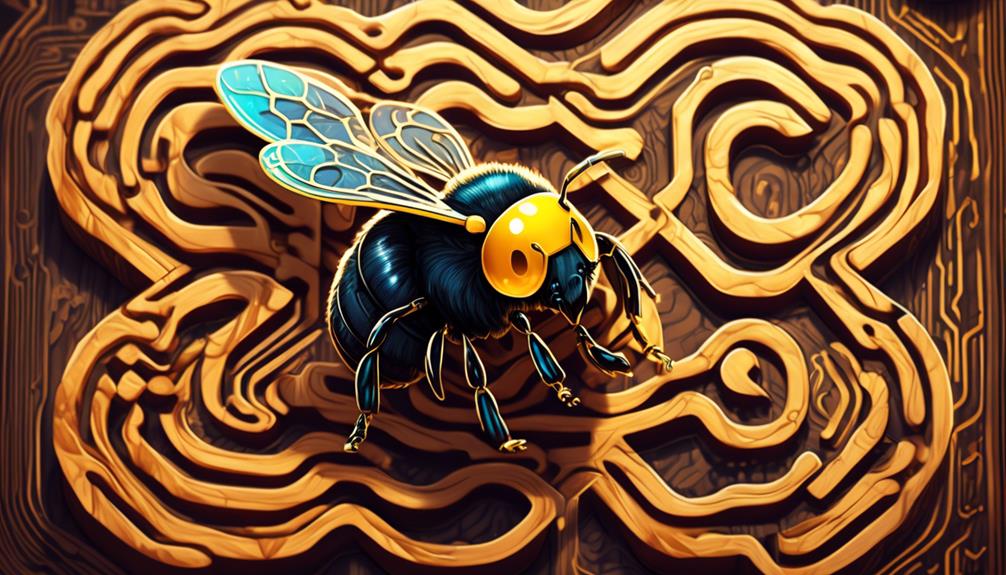
Ever wondered how carpenter bees remember where their nests are or how they learn to recognize and respond to various buzzing signals? Let's delve into the fascinating world of learning and memory in these industrious insects.
Carpenter bees possess impressive cognitive abilities. They're capable of spatial memory, which allows them to navigate back to their nests from far distances. They also exhibit associative learning, associating certain signals with rewards or threats. This is crucial for their survival and reproduction.
Here's how these learning mechanisms work:
Learning Mechanism | Function | Example |
|---|---|---|
Spatial memory | Helps in navigation | Remembering nest locations |
Associative learning | Recognizing signals | Linking flower colors to nectar availability |
Habituation | Reducing response to non-dangerous stimuli | Ignoring harmless gardeners |
Habituation is another form of learning where they lessen their responses to non-threatening stimuli, which conserves their energy for more vital tasks.
Evidence of Intelligence in Carpenter Bees
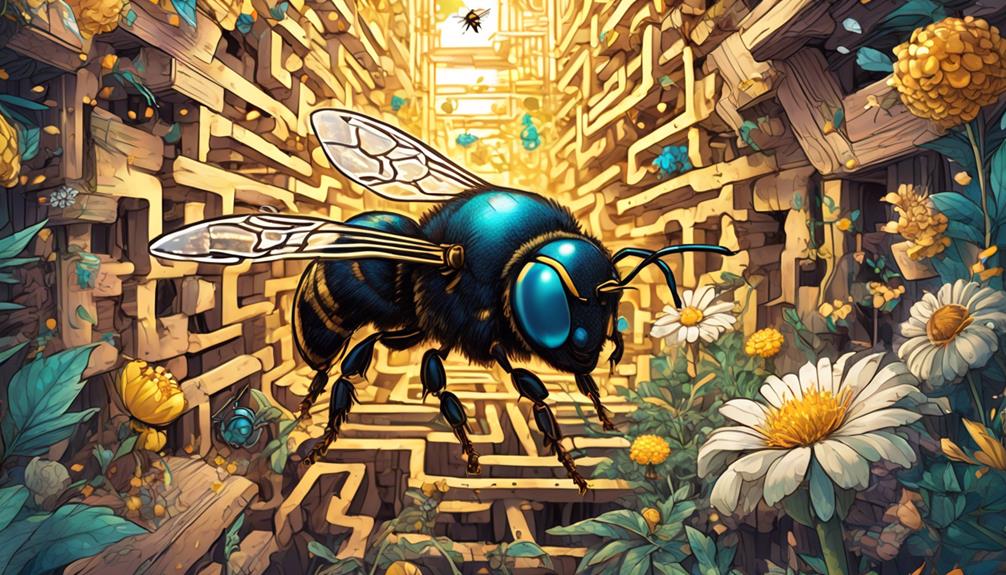
Delving into the realm of carpenter bees' intelligence, we find compelling evidence of their cognitive prowess, manifest in their intricate behaviors and complex learning mechanisms. Observational studies highlight their ability to learn from their environment, particularly in their foraging habits. They've been observed to quickly adapt their flight patterns, demonstrating a clear understanding of spatial relationships and efficient route planning. This isn't just instinctual behavior, but a sign of complex cognitive processing.
They also show strong signs of associative learning, a fundamental aspect of intelligence. You'll notice that carpenter bees can associate certain floral characteristics with food rewards, and they're capable of remembering these associations for future foraging expeditions. This isn't a simple task; it requires a high level of memory retention and decision-making ability.
Moreover, the social nature of these creatures points to a level of emotional intelligence. They display evident communication strategies, such as the waggle dance, to inform their peers about the location of food sources. This requires understanding, cooperation, and a degree of empathy, all signs of higher intelligence.
Conclusion
You've seen carpenter bees display fascinating behaviors, problem-solving skills, and social interactions. They even show signs of learning and memory. The evidence points to a level of intelligence in these insects that's quite remarkable.
So, are carpenter bees smart? It seems they indeed are. As you continue to observe their behavior, consider the complexity of their intelligence.
It's a field of study that's buzzing with potential!



